January 23, 2020
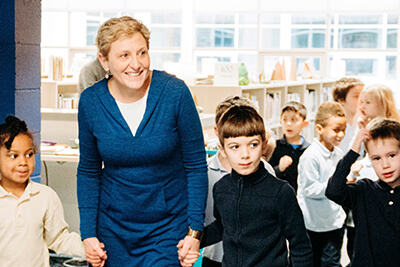 Since returning from winter break, being on campus has been extra exciting and bustling in the brand new library! We asked MPA Librarian Nancy Lage to reflect on the first few weeks of the library being open. “Our beautiful new state of the art library is located in the heart of the school. It has exceeded all of my expectations and I’m so grateful that our entire community will now have the opportunity to enjoy it,” she said. In between flurries of classes eager to use the new spaces on campus, she had wonderful recollections to share. But if you have not been in the new space yourself, we invite you to experience it firsthand!
Since returning from winter break, being on campus has been extra exciting and bustling in the brand new library! We asked MPA Librarian Nancy Lage to reflect on the first few weeks of the library being open. “Our beautiful new state of the art library is located in the heart of the school. It has exceeded all of my expectations and I’m so grateful that our entire community will now have the opportunity to enjoy it,” she said. In between flurries of classes eager to use the new spaces on campus, she had wonderful recollections to share. But if you have not been in the new space yourself, we invite you to experience it firsthand!
Do you have a favorite new library moment so far?
It’s been so rewarding to watch students, parents, and colleagues walk in the new library for the first time. Many people feel a lot of emotion. They look around and see how beautiful the new spaces are, and it gives them an overwhelming feeling of joy, excitement, and inspiration. To see the expressions on their faces is just priceless–I wish everyone could have the opportunity to see what it’s like when people walk in and see the facility for the first time. I think those emotional moments that took me by surprise are my favorite.
What are students saying about it?
I hear them say “It’s beautiful, my favorite spot in the school, awesome, I love it, it’s so bright, I love the natural light, it’s a great use of space… can I live here?!” A student recently entered the library and just stood there. When I asked if I could help her with something, she said, “I’m just looking at all the spaces and trying to decide which one I like the best!” And parents have a lot to say, too. A parent recently stopped in and said, “When I walk into the library, I feel the spirit of the school. This space is so inspiring.”
How are classes in the library enhanced?
The new library was built on doing what’s best for students. It’s a place of opportunity, a learning center where students use the best resources and technology available in a safe and nurturing environment. Not only do we have spaces for reading, research and collaborative learning, but we have a fireplace that provides warmth and comfort, individual study spaces, a vibrant and whimsical children’s room, gallery spaces for student artwork, and a brand-new display space for social studies and world language departments to share cultural projects.
Describe how you feel in the new space in three words.
In terms of how I’m feeling: inspired, grateful, energized. When thinking about the space itself: joy, connection, purpose. How it’s affecting students: imagine, explore, dream.
What are you looking forward to?
First of all, there’s been a dramatic increase in the number of students coming in to use the new spaces and resources, which is fabulous! I’m looking forward to working with students in this new facility to encourage and help enable them to become independent readers and learners. I want the whole community to benefit from all the enrichment this dynamic new library provides!
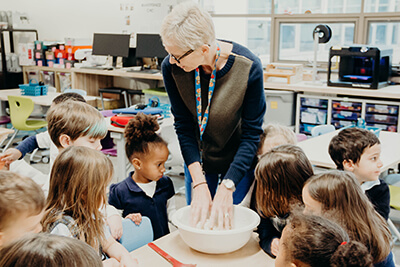 We’re interviewing the Makers you’ll meet at at Maker Fest 2020 on Saturday, February 22 so you can get to know them ahead of time! Debbie LaChapelle is MPA’s PreK teacher who loves to use the Makerspace to channel her students’ and her own creativity.
We’re interviewing the Makers you’ll meet at at Maker Fest 2020 on Saturday, February 22 so you can get to know them ahead of time! Debbie LaChapelle is MPA’s PreK teacher who loves to use the Makerspace to channel her students’ and her own creativity. Since returning from winter break, being on campus has been extra exciting and bustling in the brand new library! We asked MPA Librarian Nancy Lage to reflect on the first few weeks of the library being open. “Our beautiful new state of the art library is located in the heart of the school. It has exceeded all of my expectations and I’m so grateful that our entire community will now have the opportunity to enjoy it,” she said. In between flurries of classes eager to use the new spaces on campus, she had wonderful recollections to share. But if you have not been in the new space yourself, we invite you to experience it firsthand!
Since returning from winter break, being on campus has been extra exciting and bustling in the brand new library! We asked MPA Librarian Nancy Lage to reflect on the first few weeks of the library being open. “Our beautiful new state of the art library is located in the heart of the school. It has exceeded all of my expectations and I’m so grateful that our entire community will now have the opportunity to enjoy it,” she said. In between flurries of classes eager to use the new spaces on campus, she had wonderful recollections to share. But if you have not been in the new space yourself, we invite you to experience it firsthand!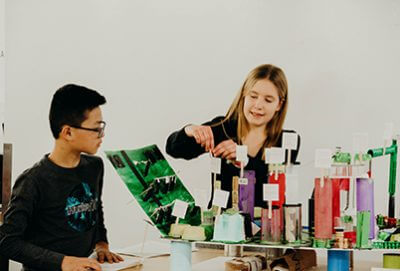 by Dr. Bill Hudson, Head of School
by Dr. Bill Hudson, Head of School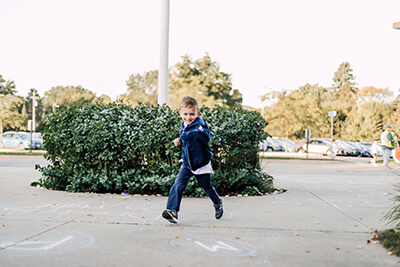 Three-year-old children are amazing sponges. They absorb everything around them, learning intuitively and actively. As toddlers approach the start of Pre-Kindergarten, it’s a unique and important time to match children with high value educational programs that will meet a broad range of developmental needs, while setting the stage for future success in school.
Three-year-old children are amazing sponges. They absorb everything around them, learning intuitively and actively. As toddlers approach the start of Pre-Kindergarten, it’s a unique and important time to match children with high value educational programs that will meet a broad range of developmental needs, while setting the stage for future success in school.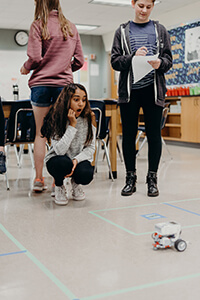 There aren’t a lot of sure things in life. Financial markets are volatile; fashion is fickle, and this year’s winning team can snooze next season. In an unpredictable world, one of the best bets you can make is investing in a rigorous and empowering college prep education that will pay life-long dividends for your child.
There aren’t a lot of sure things in life. Financial markets are volatile; fashion is fickle, and this year’s winning team can snooze next season. In an unpredictable world, one of the best bets you can make is investing in a rigorous and empowering college prep education that will pay life-long dividends for your child.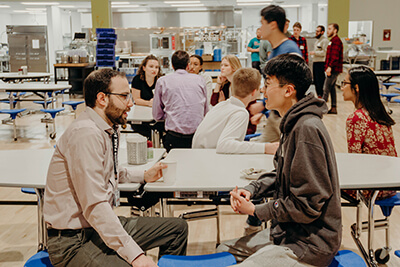 by Dr. Bill Hudson, Head of School
by Dr. Bill Hudson, Head of School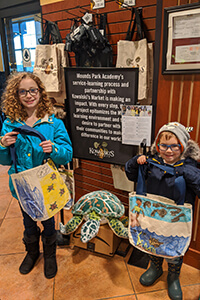 Mounds Park Academy’s service-learning process and partnership with Kowalski’s Market is making an impact! It all began when MPA kindergartners learned the letter “T” for “turtles.” They discovered that sea turtles are dying by mistaking plastic bags in their ocean habitat for food. Then, they learned the word “activist” for the letter “A.” Through responsibility, courage, and inclusiveness, they joined the Upper School students at a weekly morning meeting to message ways to save sea turtles. The kindergartners also composed a letter to Kris Kowalski, owner of Kowalski’s Market, expressing their concern around plastic bags.
Mounds Park Academy’s service-learning process and partnership with Kowalski’s Market is making an impact! It all began when MPA kindergartners learned the letter “T” for “turtles.” They discovered that sea turtles are dying by mistaking plastic bags in their ocean habitat for food. Then, they learned the word “activist” for the letter “A.” Through responsibility, courage, and inclusiveness, they joined the Upper School students at a weekly morning meeting to message ways to save sea turtles. The kindergartners also composed a letter to Kris Kowalski, owner of Kowalski’s Market, expressing their concern around plastic bags. by Renee Wright, Lower School director
by Renee Wright, Lower School director 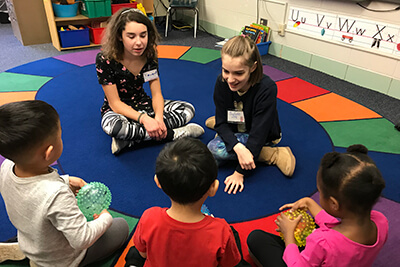 “Design For Change” is more than a phrase that our students and faculty have become very familiar with this school year. It is an organization that functions on global and national levels, working with students and educators to “turn empathy into action.” More than one million students are involved in
“Design For Change” is more than a phrase that our students and faculty have become very familiar with this school year. It is an organization that functions on global and national levels, working with students and educators to “turn empathy into action.” More than one million students are involved in 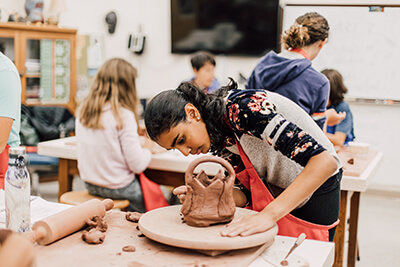 Empowering Students To Understand Stress And Navigate Anxiety
Empowering Students To Understand Stress And Navigate Anxiety